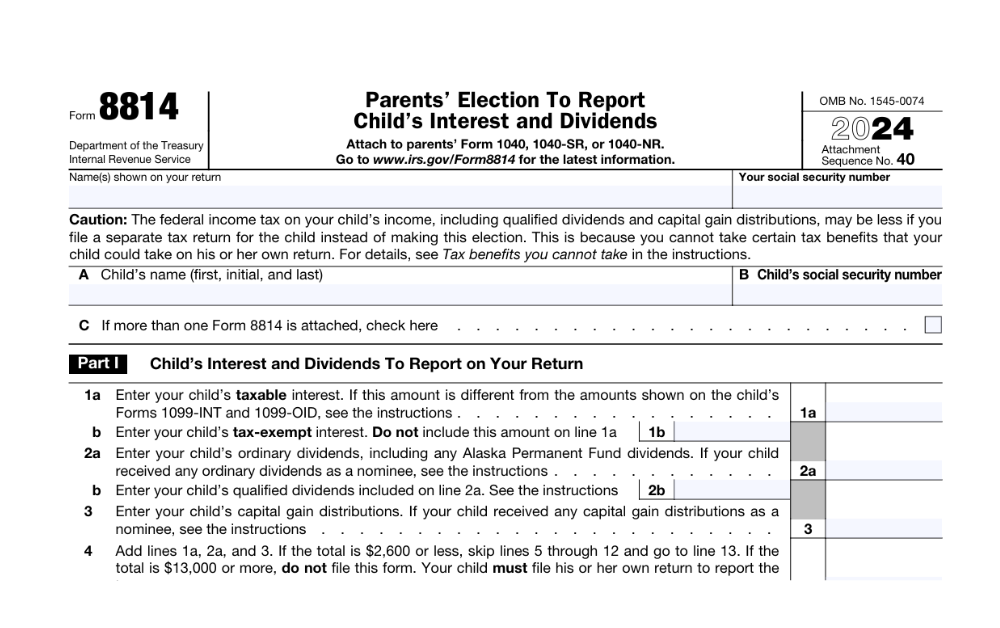Form 8814: How American Expats Can Report Their Child’s Investment Income

- What Is Form 8814?
- Who Can Use Form 8814?
- Benefits of Using Form 8814
- Potential Drawbacks to Consider
- How Form 8814 Works: Step-by-Step
- Special Considerations for Expats
- When Form 8814 Makes Sense for Expats
- When to File Separately Instead
- Common Mistakes to Avoid
- Getting Professional Help
- Next Steps
Over 1.7 million American families chose Form 8814 to report their child’s investment income in 2024, simplifying filing for families with children earning dividends and interest. If you’re an American expat with a child earning investment income, Form 8814 could save you from filing a separate tax return for your child.
The bottom line: If your child is under 19 (or under 24 if a full-time student), has gross income less than $13,500 for 2025, and only earned money from interest and dividends, you can report their income on your return using Form 8814. This means one less tax return to worry about—something every expat can appreciate.
At Greenback, we’ve helped over 23,000 expats simplify their US tax obligations. Many of our clients are surprised to learn they can consolidate their child’s investment income with their own return, reducing both complexity and preparation costs.
What Is Form 8814?
Form 8814, “Parents’ Election to Report Child’s Interest and Dividends,” allows parents to include their child’s investment income on their own tax return instead of filing a separate return for the child. The IRS created this form so children won’t have to file their own returns when they only have modest investment income.
This election is particularly valuable for expat families who already deal with complex filing requirements. You can handle everything in one filing rather than managing multiple returns across different time zones.
Who Can Use Form 8814?
Your child must meet all these requirements for you to use Form 8814:
Age Requirements:
- Under 19 years old at the end of the tax year, OR
- Under 24 years old if a full-time student
Income Requirements:
- Gross income less than $13,500 for the 2025 tax year
- Income only from interest and dividends (including capital gain distributions and Alaska Permanent Fund dividends)
- Would be required to file a return if you didn’t make this election
Additional Conditions:
- No estimated tax payments were made for your child
- No prior year overpayments were applied to the current year
- The child doesn’t file a joint return
- No backup withholding on the child’s income
If you’re not filing jointly with your child’s other parent, you must be the parent whose tax rate would determine the kiddie tax.
Get the Free Download That Makes Filing Taxes Simple
"*" indicates required fields

Benefits of Using Form 8814
- Simplified Filing Process: Instead of preparing two separate returns, you file one consolidated return. This is especially helpful for expat families managing complex international tax situations.
- Reduced Preparation Costs: Filing one return instead of two typically reduces your tax preparation fees—money that can be better spent on your expat adventures.
- Easier Record Keeping: All family tax information stays in one place, making tracking and organizing your tax documents simpler while living abroad.
Potential Drawbacks to Consider
- Higher Tax Rate: If your child received qualified dividends or capital gain distributions, you may pay up to $130 more tax by making this election instead of filing a separate return. Children often qualify for lower tax rates on investment income.
- Lost Tax Benefits: You cannot take certain deductions that would be available on your child’s separate return, including investment interest expenses, charitable contributions, or a penalty for early withdrawal of savings.
- More significantly, adding your child’s income to your return increases your adjusted gross income, which could reduce benefits like the Child Tax Credit, education tax credits, or other income-based deductions.
- Impact on Expat Tax Benefits: For expats using the Foreign Earned Income Exclusion (FEIE), adding your child’s investment income won’t affect your ability to exclude foreign earned income. However, if you’re using the Foreign Tax Credit strategy, the increased AGI could impact other tax benefits.
How Form 8814 Works: Step-by-Step
Step 1: Determine Eligibility
Verify your child meets all the above mentioned requirements. Remember, you can make this election for some children and not others—you don’t have to treat all your children the same way.
Step 2: Calculate the Tax Impact
Before deciding, compare the tax owed if you file separately versus using Form 8814. For many expat families in higher tax brackets, filing separately for the child may result in lower overall taxes.
Step 3: Complete Form 8814
A separate Form 8814 must be filed for each child whose income you choose to report. The form requires:
- Child’s name and Social Security number
- Amount of the child’s interest and dividend income
- Calculation of additional tax owed

Step 4: Attach to Your Return
Include the completed Form 8814 with your Form 1040 when you file.
Special Considerations for Expats
Foreign Investment Income
If your child has investment income from foreign sources, you’ll need to consider additional reporting requirements. You may need to complete Schedule B, Part III, and potentially file Form 8938 if your child received distributions from foreign trusts or had foreign financial accounts.
Currency Conversion
Any foreign investment income must be converted to US dollars using the appropriate exchange rate for the tax year.
FBAR Implications
If your child’s foreign financial accounts exceed $10,000 at any time during the year, FBAR filing requirements apply regardless of whether you use Form 8814.
Dreading the last minute scramble of pulling together your tax documents? Despair no more!
"*" indicates required fields

When Form 8814 Makes Sense for Expats
Corporate Expat Families
If you’re working abroad for a multinational company and your child has a modest investment account (perhaps established by grandparents), Form 8814 can simplify your already complex expat tax situation.
Low-Tax Jurisdiction Residents
Expats living in countries with favorable tax treaties or lower tax rates might benefit more from consolidating returns, especially if the additional income doesn’t push you into higher US tax brackets.
Small Investment Amounts
When your child’s investment income is relatively small (under $3,000), the administrative simplicity often outweighs the potential tax savings of filing separately.
When to File Separately Instead
- High Investment Income: If your child’s investment income approaches the $13,500 threshold, filing separately often results in lower overall taxes due to the child’s lower tax brackets.
- Significant Deductions: When your child has substantial investment-related expenses or other deductions, these might be lost if you use Form 8814.
- Protecting Other Credits: If maintaining a lower AGI is crucial for preserving the Child Tax Credit or other benefits, filing separately might be better.
Common Mistakes to Avoid
- Forgetting the Deadline: Form 8814 must be filed by your tax return deadline, including extensions. For expats, this typically means June 15 (with the automatic extension) or October 15 if you file for an additional extension.
- Mixing Election Years: You can choose differently each year—using Form 8814 one year doesn’t require you to use it the following year.
- Overlooking State Tax Implications: While Form 8814 addresses federal taxes, consider how this election affects any state tax obligations you might have.
Getting Professional Help
Form 8814 adds complexity to already intricate expat tax situations. Our team of CPAs and Enrolled Agents at Greenback has extensive experience with expat families and can help you determine whether Form 8814 makes sense for your specific situation while ensuring all international reporting requirements are properly addressed.
Many of our clients tell us they feel genuine relief knowing their family’s tax situation is handled correctly, allowing them to focus on their international adventures rather than tax compliance stress.
Next Steps
If your child has investment income and you’re considering Form 8814, start by gathering all relevant tax documents including Forms 1099-INT and 1099-DIV. Calculate both scenarios—filing separately versus using Form 8814—to determine which approach minimizes your family’s overall tax liability.
Remember: No matter how complex your family’s international tax situation may be, we can help you get it right while maintaining your peace of mind.
Contact us, and one of our customer champions will gladly help. If you need very specific advice on your specific tax situation, you can also click below to get a consultation with one of our expat tax experts.
The information provided is for general guidance only and should not be considered specific tax advice. Tax situations vary greatly, and professional consultation is recommended for your specific circumstances.



